-
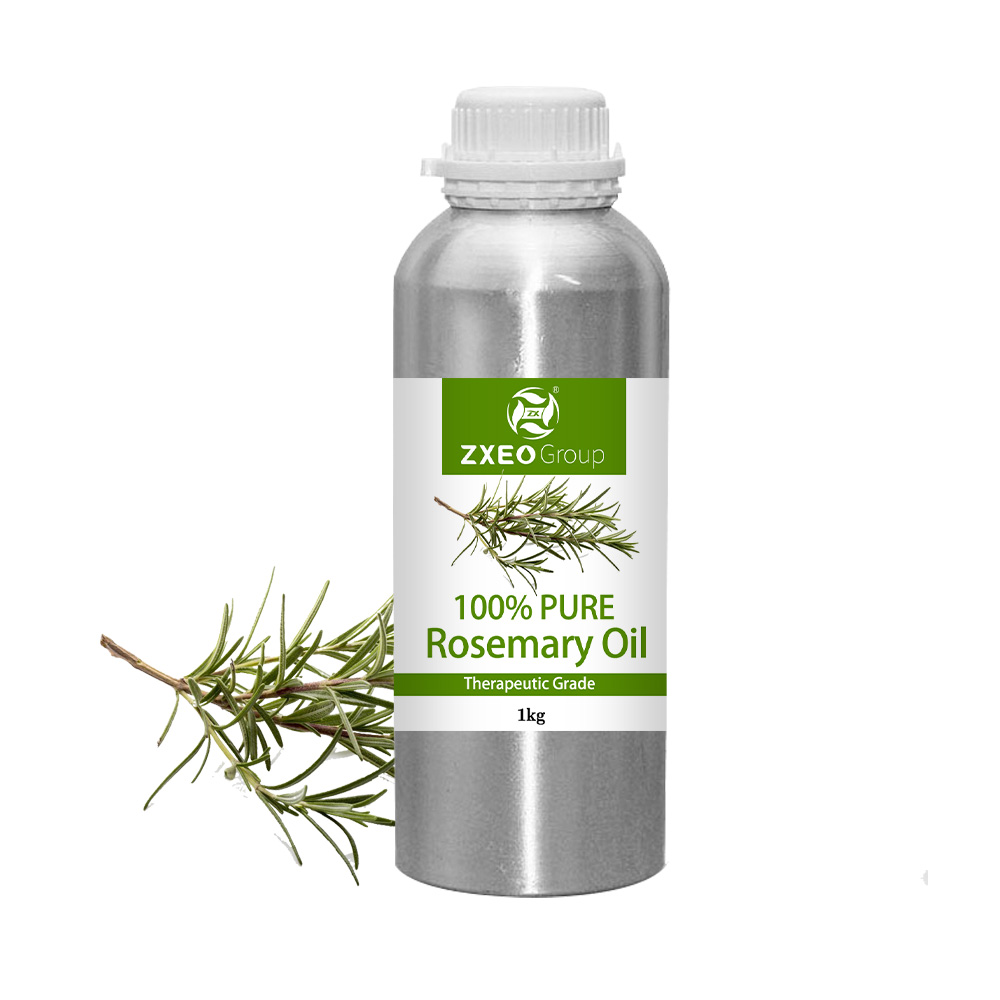
Rosemary Essential Oil Skin Care Oil Essence Hair Growth Oil Cosmetic raw material
Combat Gastrointestinal Stress
Rosemary oil can be used to relieve a variety of gastrointestinal complaints, including indigestion, gas, stomach cramping, bloating and constipation. It also stimulates appetite and helps regulate the creation of bile, which plays a crucial role in digestion. To treat stomach ailments, combine 1 teaspoon of a carrier oil such as coconut or almond oil with 5 drops of rosemary oil and gently massage the mixture over your abdomen. Applying rosemary oil in this way on a regular basis detoxifies the liver and promotes gallbladder health.
Relieve Stress and Anxiety
Research shows that simply inhaling the aroma of rosemary essential oil can lower levels of the stress hormone cortisol in your blood. High cortisol levels are caused by stress, anxiety or any thought or event that puts your body in “fight-or-flight” mode. When stress is chronic, cortisol can cause weight gain, oxidative stress, high blood pressure and heart disease. You can combat stress instantly using an essential oil diffuser or even by inhaling over an open bottle. To create an anti-stress aromatherapy spray, simply combine in a small spray bottle 6 tablespoons of water with 2 tablespoons of vodka, and add 10 drops of rosemary oil. Use this spray at night on your pillow to relax, or spray it into the air indoors any time to relieve stress.
Reduce Pain and Inflammation
Rosemary oil has anti-inflammatory and pain-relieving properties you can benefit from by massaging the oil on the affected area. Mix 1 teaspoon of a carrier oil with 5 drops of rosemary oil to create an effective salve. Use it for headaches, sprains, muscle soreness or pain, rheumatism or arthritis. You can also soak in a hot bath and add a few drops of rosemary oil to the tub.
Treat Respiratory Problems
Rosemary oil works as an expectorant when inhaled, relieving throat congestion from allergies, colds or flus. Inhaling the aroma can fight respiratory infections because of its antiseptic properties. It also has an antispasmodic effect, which helps in the treatment of bronchial asthma. Use rosemary oil in a diffuser, or add a few drops to a mug or small pot of boiling-hot water and inhale the vapor up to 3 times daily.
Promote Hair Growth and Beauty
Rosemary essential oil has been found to increase the growth of new hair by 22 percent when massaged onto the scalp. It works by stimulating scalp circulation and can be used to grow longer hair, prevent baldness or stimulate new hair growth in balding areas. Rosemary oil also slows the graying of hair, promotes shininess and prevents and reduces dandruff, making it a great tonic for overall hair health and beauty.
Enhance Memory
Greek scholars are known to have used rosemary essential oil to improve their memory before exams. A recent study published in the International Journal of Neuroscience evaluated the cognitive performance of 144 participants when using rosemary oil for aromatherapy. It found that rosemary significantly enhanced the quality of memory and increased mental alertness. Another study, published in Psychogeriatrics, tested the effects of rosemary oil aromatherapy on 28 elderly dementia and Alzheimer’s patients and found that its properties can prevent and slow Alzheimer’s disease. Add a few drops of rosemary oil to lotion and apply it to your neck, or use a diffuser to reap the mental benefits of rosemary oil’s aroma. Whenever you need a boost of mental energy, you can even inhale over the bottle of oil to get the same effects.
Fight Bad Breath
Rosemary essential oil has antimicrobial qualities that make it an effective counter for bad breath. You can use it as a mouthwash simply by adding a few drops of rosemary oil to water and swishing it around. By killing bacteria, it not only fights bad breath but also prevents plaque buildup, cavities and gingivitis.
Heal Your Skin
Rosemary oil’s antimicrobial properties make it likewise effective in treating skin problems such as acne, dermatitis and eczema. By hydrating and nourishing the skin while killing bacteria, it makes a great addition to any moisturizer. Simply add a few drops to facial moisturizer to use rosemary oil every day and get a healthy glow. To treat problem areas, dilute 5 drops of rosemary oil in 1 teaspoon of a carrier oil and apply it to the site. It won’t make your skin more oily; in fact, it removes excess oil from the surface of your skin.
-
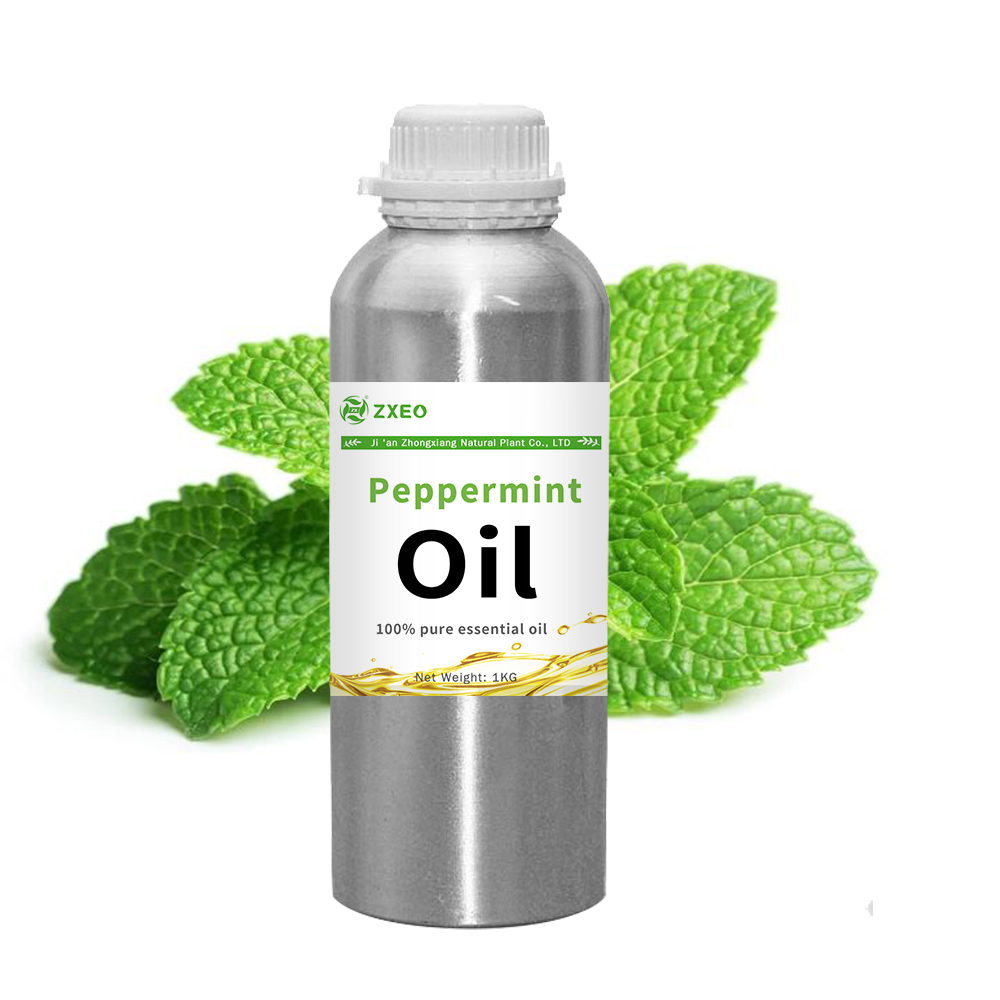
Factory Supply Pure Natural Peppermint Essential Oil For Body Care Oil
Benefits
Relieves Headaches
Peppermint oil provides instant relief from headaches, vomiting, and nausea. It helps relax the muscles and ease the pain, therefore, it is also used for migraine treatment.
Soothes Cuts & Burns
It promotes a cooling sensation that can be used to soothe skin inflammation due to cuts and burns. The astringent properties of peppermint oil make it ideal for healing cuts and small wounds.
Antibacterial
It kills bacteria that are the main reason behind skin infections, skin irritation, and other issues. The essence of peppermint oil in cosmetic and skincare products can provide the best results.Uses
Mood Refresher
The spicy, sweet, and minty fragrance of Peppermint essential oil will elevate your mood by reducing stress. It helps to relax your mind and calm your senses after a busy day.
Skincare Products
It kills bacteria causing skin infections, skin irritation, and other issues. Use peppermint oil in your cosmetic and skincare products to enhance their antibacterial properties.
Natural Perfumes
The minty scent of Peppermint Oil adds up to a unique fragrance when used in making natural perfumes. You can also make scented candles, incense sticks, and other products with this oil. -
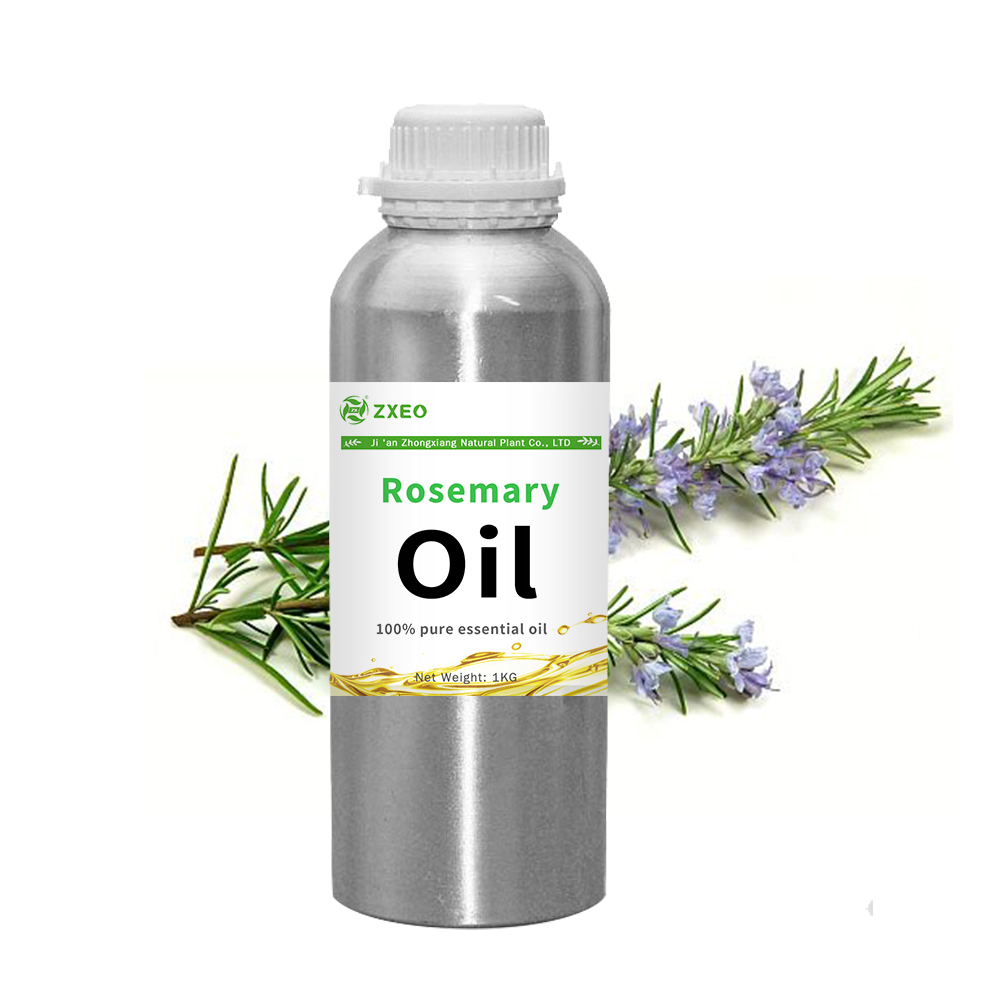
High Quality Organic Rosemary Essential Oil for Scented Aromatherapy
Benefits
Relieves Muscle Pain
Rosemary Essential Oil can relieve the stress and pain from your muscles. It proves to be an excellent massage oil due to its analgesic properties.
Rich in Vitamins
Rosemary is rich in vitamins A and C that are one of the key ingredients of skincare and hair care products. Therefore, you can use this oil for improving the overall health of your skin and hair.
Anti Aging
Rosemary essential oil reduces eye puffiness and gives you glowing and healthy skin. It combats skin issues like wrinkles, fine lines, etc. that are associated with the aging of the skin.Uses
Aromatherapy
When used in aromatherapy, Rosemary oil can improve mental clarity and provide relief from fatigue and stress. It has a positive effect on your mood and can be used to reduce anxiety as well.
Room Freshener
The refreshing scent of rosemary oil makes it ideal for eliminating the foul odor from your rooms. For that, you need to dilute it with water and add it to an oil diffuser.
For Irritated Scalp
People suffering from the itchy or dry scalp can massage a diluted form of rosemary oil on their scalp. It also prevents premature greying of your hair to some extent. -
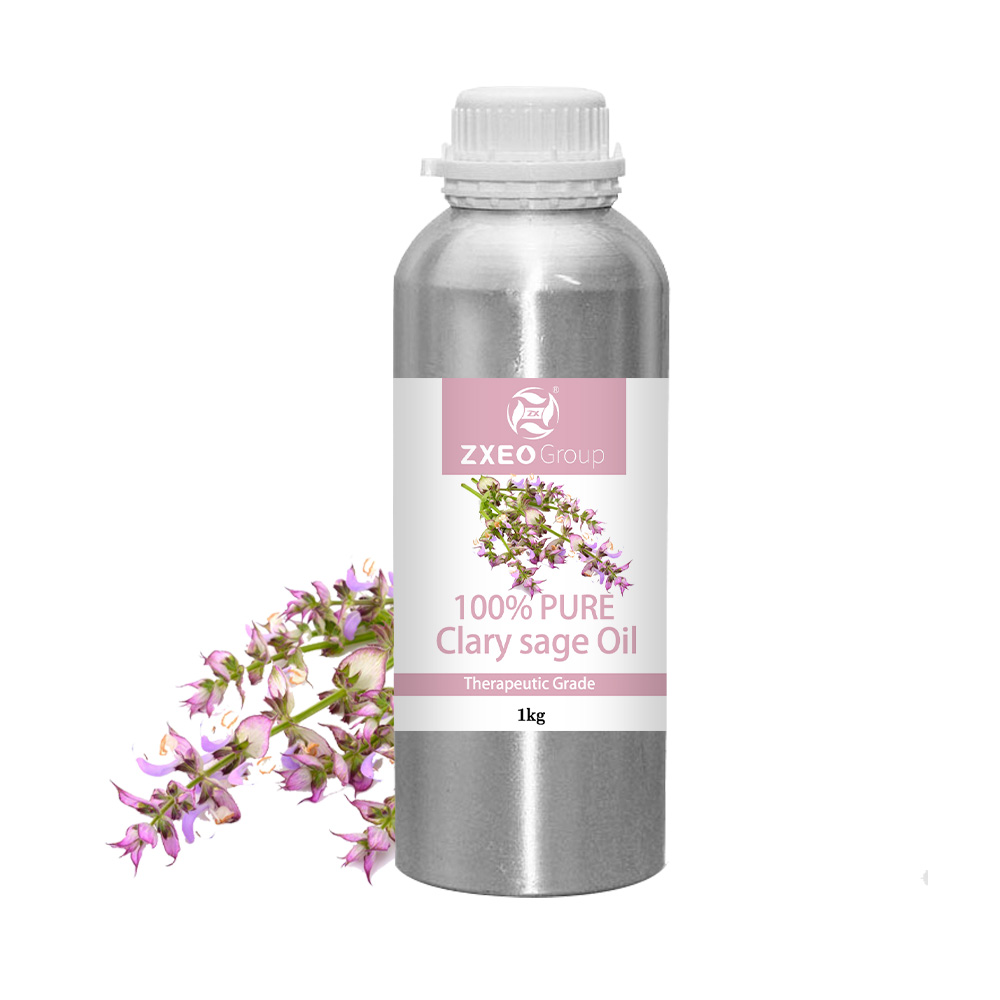
Factory supplier Wholesale Private Label Aromatherapy Bulk Pure Organic Clary Sage Essential Oil New For Cosmetic
1. Relieves Menstrual Discomfort
Clary sage works to regulate the menstrual cycle by balancing hormone levels naturally and stimulating the opening of an obstructed system. It has the power to treat symptoms of PMS as well, including bloating, cramps, mood swings and food cravings.
This essential oil is also antispasmodic, meaning it treats spasms and related issues such as muscle cramps, headaches and stomachaches. It does this by relaxing the nerve impulses that we can’t control.
An interesting study done at the Oxford Brooks University in the United Kingdom analyzed the influence that aromatherapy has on women in labor. The study took place over a period of eight years and involved 8,058 women.
The evidence from this study suggests that aromatherapy can be effective in reducing maternal anxiety, fear and pain during labor. Of the 10 essential oils that were used during childbirth, clary sage oil and chamomile oil were the most effective in alleviating pain.
Another 2012 study measured the effects of aromatherapy as a painkiller during the menstrual cycle of high school girls. There was an aromatherapy massage group and an acetaminophen (pain killer and fever reducer) group. The aromatherapy massage was performed on subjects in the treatment group, with the abdomen being massaged once using clary sage, marjoram, cinnamon, ginger and geranium oils in a base of almond oil.
The level of menstrual pain was assessed 24 hours later. The results found that the reduction of menstrual pain was significantly higher in the aromatherapy group than in the acetaminophen group.
2. Supports Hormonal Balance
Clary sage affects the hormones of the body because it contains natural phytoestrogens, which are referred to as “dietary estrogens” that are derived from plants and not within the endocrine system. These phytoestrogens give clary sage the ability to cause estrogenic effects. It regulates estrogen levels and ensures the long-term health of the uterus — reducing the chances of uterine and ovarian cancer.
A lot of health issues today, even things like infertility, polycystic ovary syndrome and estrogen-based cancers, are caused from excess estrogen in the body — in part because of our consumption of high-estrogen foods. Because clary sage helps balance out those estrogen levels, it’s an incredibly effective essential oil.
A 2014 study published in the Journal of Phytotherapy Research found that inhalation of clary sage oil had the ability to reduce cortisol levels by 36 percent and improved thyroid hormone levels. The study was done on 22 post-menopausal women in their 50s, some of whom were diagnosed with depression.
At the end of the trial, the researchers stated that “clary sage oil had a statistically significant effect on lowering cortisol and had an anti-depressant effect improving mood.” It’s also one of the most recommended menopause supplements.
3. Relieves Insomnia
People suffering from insomnia may find relief with clary sage oil. It is a natural sedative and will give you the calm and peaceful feeling that is necessary in order to fall asleep. When you can’t sleep, you usually awaken feeling unrefreshed, which takes a toll on your ability to function during the day. Insomnia affects not only your energy level and mood, but also your health, work performance and quality of life.
Two major causes of insomnia are stress and hormonal changes. An all-natural essential oil can improve insomnia without drugs by alleviating feelings of stress and anxiety, and by balancing hormone levels.
A 2017 study published in Evidence-Based Complementary and Alternative Medicine showed that applying a massage oil including lavender oil, grapefruit extract, neroli oil and clary sage to the skin worked to improve sleep quality in nurses with rotating night shifts.
4. Increases Circulation
Clary sage opens the blood vessels and allows for increased blood circulation; it also naturally lowers blood pressure by relaxing the brain and arteries. This boosts the performance of the metabolic system by increasing the amount of oxygen that gets into the muscles and supporting organ function.
-
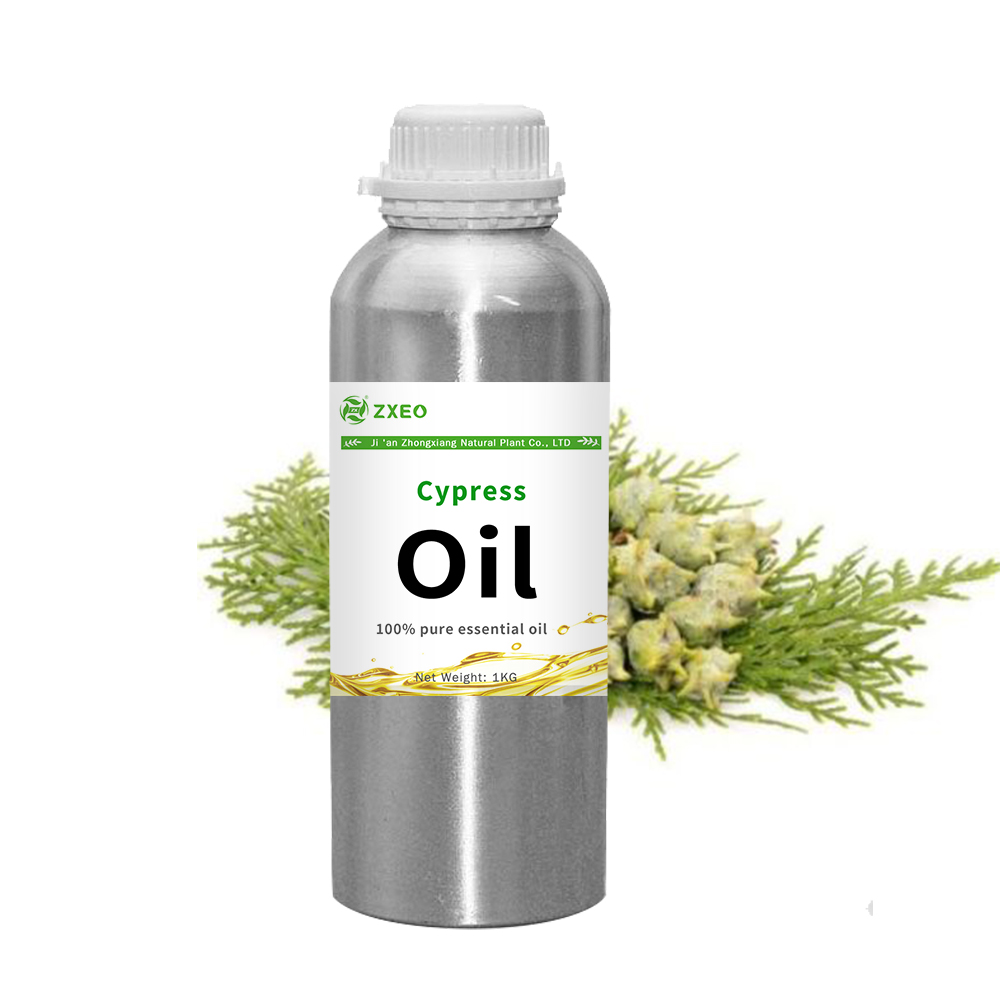
Best Prices 100% Organic Cypress Oil For Fragrance Diffuser Aromatherapy
Benefits
Moisturizes Skin
The emollient properties of our pure Cypress essential oil will nourish your skin and make it soft and healthy. Makers of moisturizers and body lotions vouch for the nutritive properties of the Cypress essential oil.
Eliminates Dandruff
People who suffer from dandruff can massage Cypress essential oil on their scalp for quick relief. It not only eliminates dandruff but also minimizes itchiness and scalp irritation to a great extent.
Heals Wounds
Our pure Cypress essential oil is used widely in antiseptic creams and lotions due to its antiseptic properties. It prevents the spread of infection, wounds and facilitates faster recovery as well.Uses
Removes Toxins
Sudorific properties of Cypress Essential Oil promote sweating and this assists in eliminating excess oil, salt, and toxins from your body. You will feel light and fresh after using Cypress oil topically.
Promotes Sleep
Sedative properties of Cypress Essential Oil relax your body and mind and promote deep sleep. It can also be used to treat anxiety and stress issues. For receiving these benefits, you will need to add a few drops of pure Cypress Oil to a diffuser.
Aromatherapy Massage Oil
Antispasmodic properties of Cypress Essential Oil can provide relief from muscle stress, spasms, and convulsions. The athletes can massage their body with this oil regularly to reduce muscle cramps and spasms. -

Factory Supply Natural Thyme Essential Oil for Food Additives
Benefits
Deodorizing Products
Antispasmodic properties of Thyme oil reduce symptoms of cold and cough. Thyme oil also exhibits anti-inflammatory properties. In Addition, you can apply it to the areas that are affected due to infection or irritation to soothe them.
Faster Wounds Healing
Thyme essential oil prevents further spreading and stops the wounds from getting septic. Its anti-inflammatory properties will soothe inflammation or pain as well.
Making Perfumes
The spicy and dark fragrance of thyme essential oil is used to make perfumes. In perfumery, it is usually used as a middle note. The antimicrobial properties of thyme oil can be used to enhance the shelf life of your skincare and cosmetic products.Uses
Making Beauty Products
Beauty care products like face masks, face scrubs, etc., can be easily made with Thyme Essential Oil. You can also add it directly to your lotions and face scrubs to improve their cleansing and nourishing properties.
DIY Soap Bar & Scented Candles
Thyme Oil proves to be an essential ingredient if you want to make DIY natural Perfumes, Soap bars, Deodorants, Bath oils, etc. You can also use it to make scented candles and incense sticks.
Hair Care Products
Hair loss can be prevented by massaging your hair and scalp regularly with a combination of thyme essential oil and suitable carrier oil. It not only makes hair follicles stronger but also stimulates the growth of new hair. -

Sandalwood oil retains a prominent place in many traditional medicines due to its purifying nature, having demonstrated anti-bacterial, anti-fungal, anti-inflammatory, and anti-oxidative activity in controlled laboratory studies. It also retains a strong reputation for addressing emotional imbalances due to the calming and uplifting character of its scent.
Used in aromatherapy, Sandalwood Essential Oil is known to help ground and quiet the mind, supporting feelings of peace and clarity. A renowned mood enhancer, this essence is reputed to facilitate all kinds of related benefits, from reduced feelings of tension and anxiety to higher quality sleep and increased mental alertness to enhanced feelings of harmony and sensuality. Centering and balancing, the smell of Sandalwood complement meditation practices by promoting a sense of spiritual wellbeing. A calming oil, it is further reputed to help manage feelings of discomfort due to headaches, coughs, colds, and indigestion, promoting feelings of relaxation instead.
Sandalwood Essential Oil is composed mainly of the free alcohol isomers α-Santalol and β-Santalol and of various other sesquiterpenic alcohols. Santalol is the compound responsible for the oil’s characteristic aroma. In general, the higher the concentration of Santalol, the higher quality of the oil.
α-Santalol is known to:
- Possess a light woody aroma
- Be present in a higher concentration than β-Santalol
- Demonstrate antimicrobial, anti-inflammatory, and anti-carcinogenic activity in controlled laboratory studies
- Contribute to the calming influence of Sandalwood Essential Oil and others
β-Santalol is known to:
- Possess a strong woody aroma with creamy and animalic undertones
- Possess cleansing properties
- Demonstrate anti-microbial and anti-carcinogenic activity in controlled laboratory studies
- Contribute to the calming influence of Sandalwood Essential Oil and others
Sesquiterpenic alcohols are known to:
- Contribute to the purifying properties of Sandalwood Essential Oil and others
- Enhance the grounding influence of Sandalwood Essential Oil and others
- Contribute to the soothing touch of Sandalwood Essential Oil and others
In addition to its aromatherapeutic benefits, Sandalwood Essential Oil benefits for cosmetic purposes are abundant and multifaceted. Used topically, it is gently cleansing and hydrating, helping to smooth the skin and balanced complexion. In hair care, it is known to help maintain a soft texture, and to promote natural volume and lustrousness.
-

100% Natural Aromatherapy frankincense essential Oil Pure private label essential oils
1. Fights Acne and Other Skin Conditions
Due to tea tree oil’s antibacterial and anti-inflammatory properties, it has potential to work as a natural remedy for acne and other inflammatory skin conditions, including eczema and psoriasis.
A 2017 pilot study conducted in Australia evaluated the efficacy of tea tree oil gel compared to a face wash without tea tree in the treatment of mild to moderate facial acne. Participants in the tea tree group applied the oil to their faces twice a day for a 12-week period.
Those using tea tree experienced significantly fewer facial acne lesions compared to those using the face wash. No serious adverse reactions occurred, but there were some minor side effects like peeling, dryness and scaling, all of which resolved without any intervention.
2. Improves Dry Scalp
Research suggests that tea tree oil is able to improve symptoms of seborrheic dermatitis, which is a common skin condition that causes scaly patches on the scalp and dandruff. It’s also reported to help alleviate contact dermatitis symptoms.
A 2002 human study published in the Journal of the American Academy of Dermatology investigated the efficacy of 5 percent tea tree oil shampoo and placebo in patients with mild to moderate dandruff.
After a four-week treatment period, participants in the tea tree group showed a 41 percent improvement in the severity of dandruff, while only 11 percent of those in the placebo group showed improvements. Researchers also indicated an improvement in patient itchiness and greasiness after using tea tree oil shampoo.
3. Soothes Skin Irritations
Although the research on this is limited, tea tree oil’s antimicrobial and anti-inflammatory properties may make it a useful tool for soothing skin irritations and wounds. There is some evidence from a pilot study that after being treated with tea tree oil, patient wounds began to heal and reduced in size.
There have been case studies that show tea tree oil’s ability to treat infected chronic wounds.
Tea tree oil may be effective in reducing inflammation, fighting skin or wound infections, and reducing wound size. It can be used to soothe sunburns, sores and insect bites, but it should be tested on a small patch of skin first to rule out a sensitivity to topical application.
4. Fights Bacterial, Fungal and Viral Infections
According to a scientific review on tea tree published in Clinical Microbiology Reviews, data clearly shows the broad-spectrum activity of tea tree oil due to its antibacterial, antifungal and antiviral properties.
This means, in theory, that tea tree oil can be used to fight a number of infections, from MRSA to athlete’s foot. Researchers are still evaluating these tea tree benefits, but they have been shown in some human studies, lab studies and anecdotal reports.
Lab studies have showed that tea tree oil can inhibit the growth of bacteria like Pseudomonas aeruginosa, Escherichia coli, Haemophilus influenzae, Streptococcus pyogenes and Streptococcus pneumoniae. These bacteria cause serious infections, including:
- pneumonia
- urinary tract infections
- respiratory illness
- bloodstream infections
- strep throat
- sinus infections
- impetigo
Because of tea tree oil’s antifungal properties, it may have the ability to fight or prevent fungal infections like candida, jock itch, athlete’s foot and toenail fungus. In fact, one randomized, placebo-controlled, blinded study found that participants using tea tree reported a clinical response when using it for athlete’s foot.
Lab studies also show that tea tree oil has the ability to fight recurrent herpes virus (which causes cold sores) and influenza. The antiviral activity displayed in studies has been attributed to the presence of terpinen-4-ol, one of the oil’s main active components.
5. May Help Prevent Antibiotic Resistance
Essential oils like tea tree oil and oregano oil are being used in replacement of or along with conventional medications because they serve as powerful antibacterial agents without the adverse side effects.
Research published in the Open Microbiology Journal indicates that some plant oils, like those in tea tree oil, have a positive synergistic effect when combined with conventional antibiotics.
Researchers are optimistic that this means plant oils may help prevent antibiotic resistance from developing. This is extremely important in modern medicine because antibiotic resistance may lead to treatment failure, increased health care costs and the spread of infection control problems.
6. Relieves Congestion and Respiratory Tract Infections
Very early in its history, the leaves of the melaleuca plant were crushed and inhaled to treat coughs and colds. Traditionally, the leaves were also soaked to make an infusion that was used to treat sore throats.
Today, studies show that tea tree oil has antimicrobial activity, giving it the ability to fight bacteria that lead to nasty respiratory tract infections, and antiviral activity that’s helpful for fighting or even preventing congestion, coughs and the common cold. This is exactly why tea tree is one of the top essential oils for cough and respiratory issues.
-
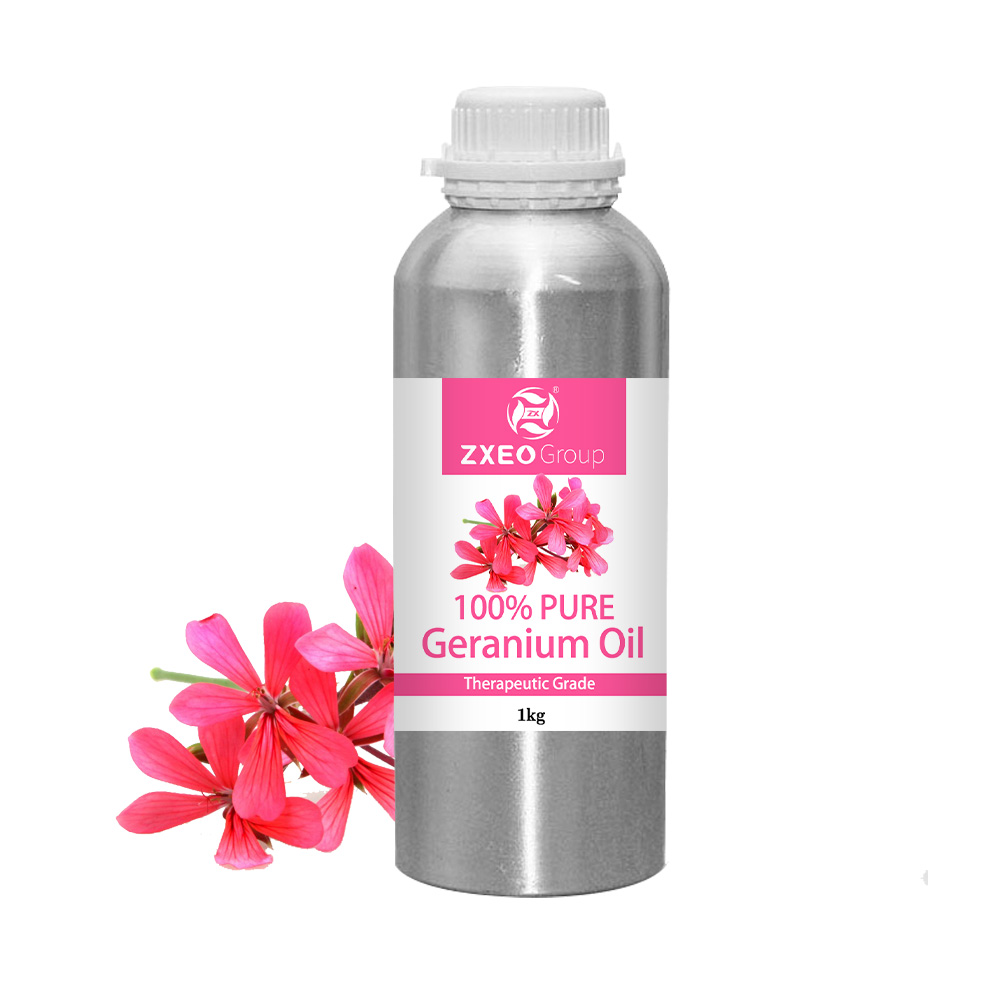
Highest Quality Customized Label Pure Natural Geranium Essential Oil In Bulk Geranium Oil
1. Wrinkle Reducer
Rose geranium oil is known for its dermatological use for the treatment of aging, wrinkled and/or dry skin. (4) It has the power to minimize the look of wrinkles because it tightens facial skin and slows down the effects of aging.
Add two drops of geranium oil to your face lotion and apply it twice daily. After a week or two, you may just see the look of your wrinkles begin to fade away.
2. Muscle Helper
Are you sore from an intense workout? Using some geranium oil topically may help with any muscle cramps, aches and/or pains plaguing your sore body. (5)
Create a massage oil by mixing five drops of geranium oil with one tablespoon of jojoba oil and massage it into your skin, focusing on your muscles.
3. Infection Fighter
Research has shown that geranium oil has potent antibacterial and anti-fungal abilities against at least 24 different types of bacteria and fungi. (6) These antibacterial and anti-fungal properties found in geranium oil can help to protect your body from infection. When you use geranium oil to fight external infection, your immune system can focus on your internal functions and keep you healthier.
To help prevent infection, apply two drops of geranium oil combined with a carrier oil like coconut oil to the area of concern, such as a cut or wound, twice a day until it has healed. (7)
Athlete’s foot, for example, is a fungal infection that can be helped with the use of geranium oil. To do this, add give drops of geranium oil to a foot bath with warm water and sea salt; do this twice daily for the best results.
-
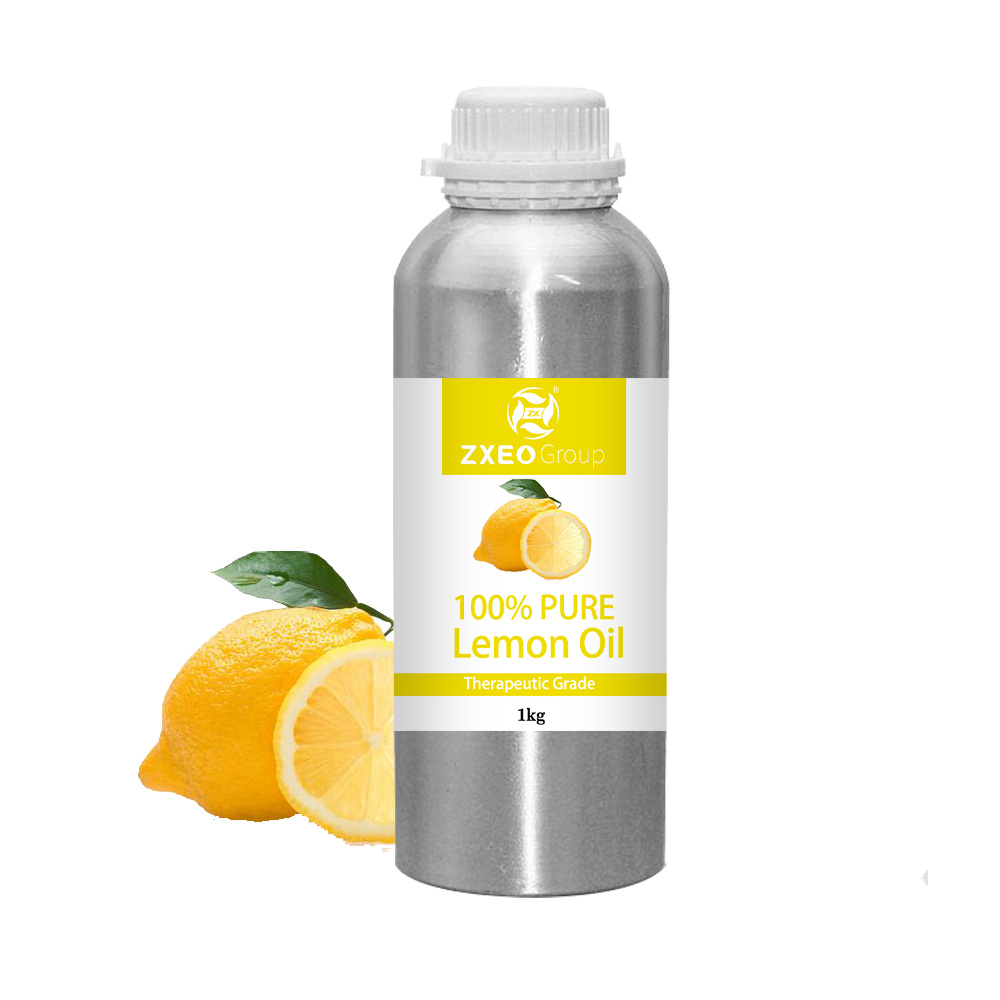
Lemon Essential Oil & Natural ( Citrus X Limon ) – 100% Pure Diffuser Essential Oils Aromatherapy Skin Care Top Grade OEM/ODM
Lemon, scientifically called Citrus limon, is a flowering plant that belongs to the Rutaceae family. Lemon plants are grown in many countries all over the world, although they are native to Asia and believed to have been brought to Europe around 200 A.D.
In America, English sailors used lemons while on the sea to protect themselves from scurvy and conditions caused by bacterial infections.
Lemon essential oil comes from cold-pressing the lemon peel, not the inner fruit. The peel is actually the most nutrient-dense portion of the lemon because of its fat-soluble phytonutrients.
Research indicates that lemon essential oil is composed of many natural compounds, including:
- terpenes
- sesquiterpenes
- aldehydes
- alcohols
- esters
- sterols
Lemons and lemon oil are popular because of their refreshing scent and invigorating, purifying and cleaning properties. Research shows that lemon oil contains powerful antioxidants and helps reduce inflammation, fight bacteria and fungi, boost energy levels, and ease digestion.
-
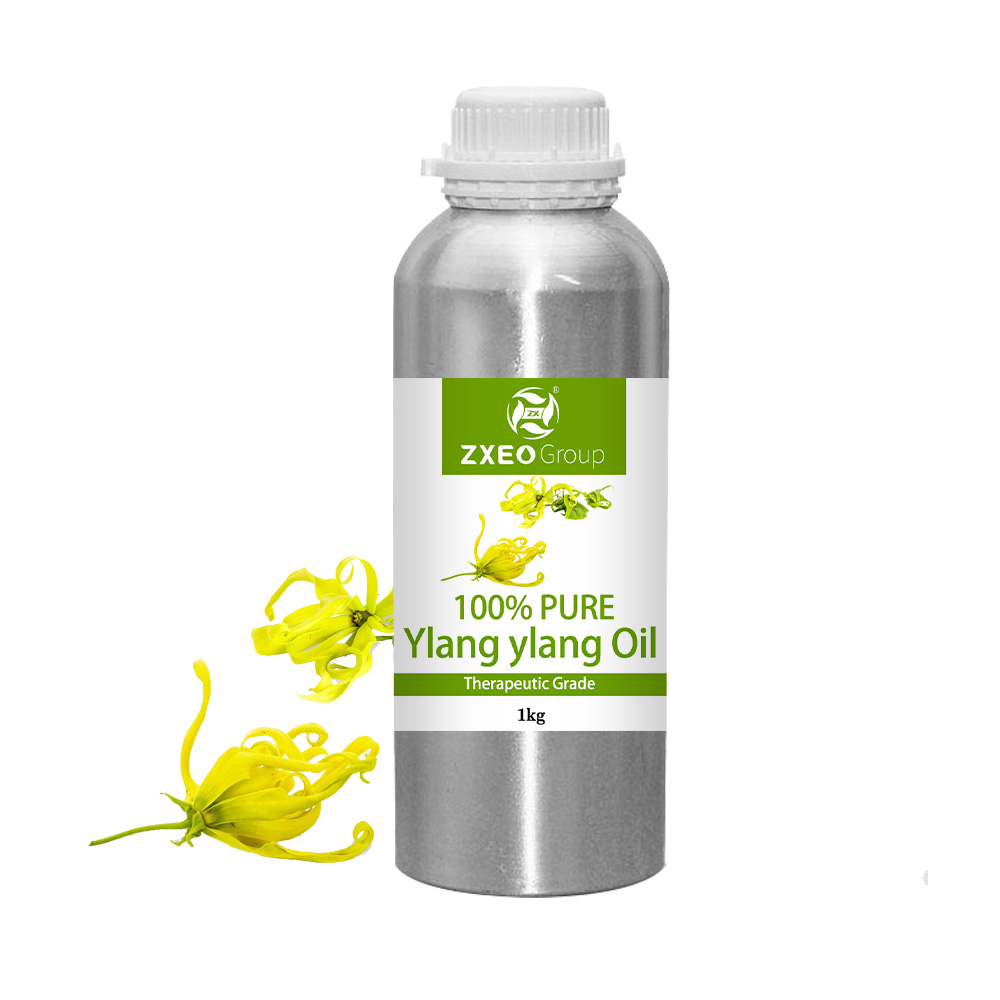
OEM/ODM Top Grade Massage Essential Oil Pure Extract Natural Ylang Ylang Oil For Diffuser
Ylang Ylang Essential Oil, pronounced “Ee-lang Ee-lang,” receives its common name from the repetition of the Tagalog word “ilang,” meaning “wilderness,” which is where the tree is naturally found. The wilderness to which it is native or in which it is cultivated includes the tropical rainforests of the Philippines, Indonesia, Java, Sumatra, Comoro, and Polynesia. The Ylang Ylang tree, scientifically identified as the Cananga odorata botanical, is also sometimes referred to as The Fragrant Cananga, The Perfume Tree, and The Macassar Oil Plant.
Ylang Ylang Essential Oil is derived from the steam distillation of the plant’s sea star-shaped flowering parts. It is known to have a scent that can be described as sweetly and delicately floral and fresh with a fruity nuance. There are 5 varieties of Ylang Ylang Essential Oil available in the market: In the first 1-2 hours of distillation, the distillate obtained is called Extra, while grades I, II and III of Ylang Ylang Essential Oil are extracted in the following hours by specifically determined fractions of time. The fifth variety is referred to as Ylang Ylang Complete. This final distillation of Ylang Ylang is typically achieved after it has been distilled for 6-20 hours. It retains the characteristic rich, sweet, floral scent; however, its undertone is more herbaceous than the previous distillations, thus its general scent is lighter than that of Ylang Ylang Extra. The name ‘Complete’ refers to the fact that this variety is the result of a continuous, undisturbed distillation of the Ylang Ylang flower.
In Indonesia, Ylang Ylang flowers, believed to have aphrodisiac properties, are sprinkled on the bed of a newlywed couple. In the Philippines, Ylang Ylang Essential Oil is used by healers to address cuts, burns, and bites from both insects and snakes. In the Molucca islands, the oil was used to make a popular hair pomade called Macassar Oil. In the early 20th century, after its medicinal properties were discovered by a French chemist, Ylang Ylang Oil came to be used as a potent remedy for infections of the intestines and for typhus and malaria. Eventually, it became popular around the world for its ability to promote relaxation by easing the symptoms and effects of anxiety and harmful stress.
Today, Ylang Ylang Oil continues to be used for its health-enhancing characteristics. Due to its soothing and stimulating properties, it is reputed to be beneficial for addressing ailments associated with women’s reproductive health, such as premenstrual syndrome and low libido. Additionally, it is beneficial for calming stress-related ailments such as anxiety, depression, nervous tension, insomnia, high blood pressure, and palpitations.
-
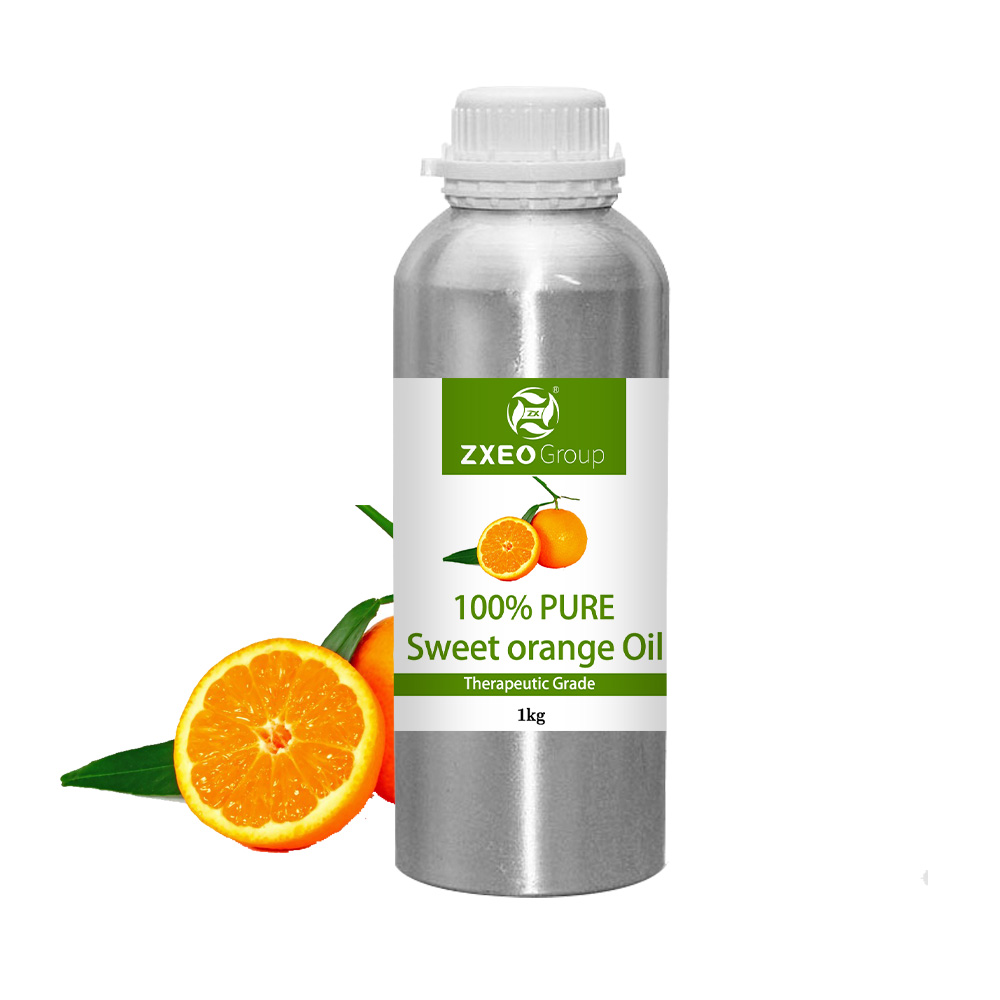
Small Package 100% Pure Concentrated Sweet Orange Essential Oil Orange Peeling Massage Oil
1. Energizing Boost: Place 1-2 drops of orange essential oil in the palm of your hand along with an equal amount of peppermint essential oil. Rub palms together and inhale deeply. Rub your palms on the back of your neck for an even stronger boost!
2. Skin + Hair: Sweet orange essential oil is antiseptic and anti-inflammatory which makes this oil an ideal addition to your skin and hair routine. Known to increase the ability to absorb vitamin C, collagen production, and blood flow, all of which are essential for anti-aging.
3. Bath: To help alleviate stress brought on by seasonal affective disorder, depression and premenstrual syndrome, add 8-10 drops of orange essential oil in bath water.
4. Laundry: Place a few drops of orange oil on wool dryer balls or to a clean freshly laundered washcloth before adding to the dryer. The bright clean scent of orange will make your clothes and sheets smell great without the use of synthetic fragrances.
5. Homemade Tub Cleaner: To avoid the residue of chemicals that comes with a conventional tub scrub, use these effective ingredients instead. Mix 1 cup baking soda, 1/4 cup castile soap, 1 TBLS of hydrogen peroxide and 10 -15 drops of orange essential oil.
6. DIY Air Freshener: Mix together 3/4 cup water, 2 TBLS of vodka, rubbing alcohol or real vanilla extract, and 10 drops of orange essential oil. Mix together and store in a glass spray bottle.
7. Massage Oil: mix several drops of orange essential oil in a carrier oil for a delightfully calming scent. This is especially effective when applied to the abdomen for relieving cramps.
8. Antibacterial Counter Spray: Add 5 drops of orange essential oil to this DIY counter spray and use on kitchen counters, wooden cutting boards and appliances for a clean naturally antibacterial solution that also smells pleasant rather than like a strong chemical.

